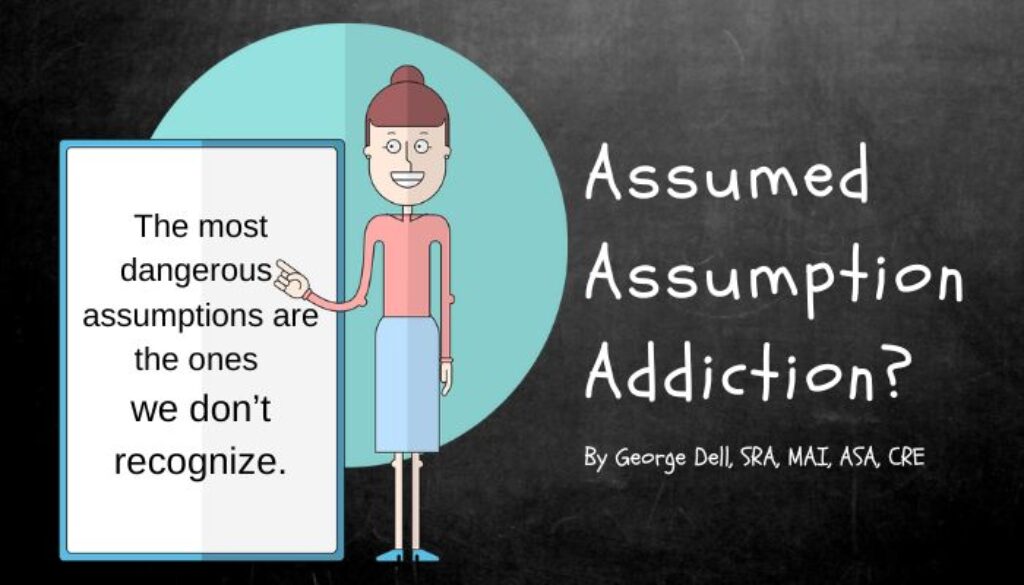Assume what condition your assumption is in!
Editor’s Note: This is Standards, part 3.13 of George Dell’s series on How Do I Move to EBV? Links to the earlier posts are here.
Assumptions are a critical part of all analyses or reasoning logic. Assumptions about assumptions are interesting. Two starting points are assumed: 1) the universe is orderly; and, 2) the human brain can figure out that order.
Interestingly, point two explains part of the current interest in human bias. It seems to be a universal truth that a biased brain does not know it is biased! Just as an addicted brain denies it’s addiction.
In USPAP, all such things are lumped under the category called “assignment conditions.” These include assumptions, and exceptions under laws and administrative orders.
Some assumptions are explicit, some contextual, some are use-oriented, and yet others are assumed assumptions (we don’t talk about these, no, shhhh). Such as the client’s needs, including the intended use, value definition, effective date, the subject (and characteristics). Even who the client is can influence the work-scope (e.g., for litigation versus for a loan).
Acceptability of the conditions in “scope of work” is directed in USPAP by: 1) what peers all do; and, 2) what clients expect. These two ‘rules of acceptability’ override all else. (Assignment conditions are an explicit part of scope of work.)
“The most dangerous assumptions are the ones we don’t recognize.”
Unfortunately, the “appraisal process” is replete with unrecognized assumptions. And these become embedded in standards, “accepted” practices, user expectations, regulations, license requirements, regurgitated education, and almighty personal “experience” as handed down from trainer to trainee.
The list of randomly assumed assumptions:
- Appraisal is an art.
- Appraisal is really science.
- Market price is the true value.
- Good comps are carefully picked.
- Adjustments are always calculated.
- There are three approaches to value.
- A house is a house of course, of course.
- Market analysis is current and future oriented.
- Reconciliation explains why numbers don’t add up.
- Believability (credibility) is the best measure of usefulness.
- A perfect pair gives the perfect adjustment – and even exists.
- Standards violations are clearly set out by the Appraisal Foundation.
- 54 State and territory appraiser boards assure the most current education.
These hidden and unrecognized assumptions complexify appraisal. They create uncertainty and unsureness for appraisers, for clients, and systematically compromise the public trust.
Valuations deal mostly with measurable, number-oriented things. But expert judgment is still needed. Good judgment is the essence of data science, data analysis, and Evidence Based Valuation (EBV)©.
EBV is the true core of “modernized appraisal” – the expert, the judgment part of process technology.

September 15, 2023 @ 7:37 am
“Two starting points are assumed: 1) the universe is orderly; and, 2) the human brain can figure out that order.”
That is so funny.
Figure the universe’s order out with what, math? Math is a human construct. Humans have not discovered the ‘language’ of the universe, and our attempts to use Math and Physics have resulted in null sets at the quantum and infinite (Einsteinian) levels.
However, for valuing real property (a human construct) math is reasonable to use.
September 16, 2023 @ 7:40 am
Exactly! However, math is reasonable to use only if you can support it’s use. USPAP is silent upon exactly what support is required. One of the many places appraisers are required to use judgement that should be rendered valid by reviewers if that judgement is reasonable.
“I have perceived the numbers that we enumerate, but those numbers with which we enumerate are something different. They are not the images of the other ones, and yet they truly exist. Let him who does not perceive them laugh at me for making these statements; I will pity him for laughing at me.” ~ St. Augustine (quoted only partly tongue-in-cheek)
USPAP requires only that your assumptions, whether or not they involve math, would be those your peers would also make. A slippery slope, if ever there was one.
September 18, 2023 @ 3:25 pm
Here’s are more questionable assumptions: market participants are rational and profit-maximizing. People make decisions using adjustment grids. Market value as of the effective date is sustainable, or persistent, or intrinsic. Depreciation estimates can be made reliably. We could do this all day.